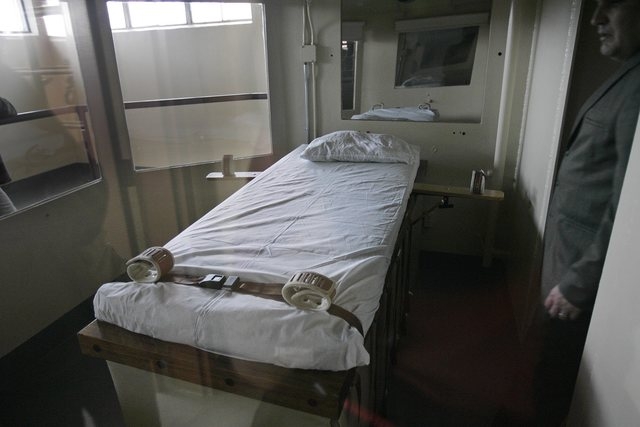Nevada has 80 on death row, but no place to execute

CARSON CITY — Nevada has more than 80 men on death row but no suitable place to execute them should the state need to carry out capital punishment, a panel of lawmakers was told last week.
So lawmakers again are being asked to fund a new execution chamber at Ely State Prison so Nevada can be prepared to carry out a lethal injection should a court order be issued. The facility in remote eastern Nevada is the state’s only maximum security prison.
Greg Cox, director of the Department of Corrections, acknowledged in a budget hearing last week that no executions are in the offing.
But if a court orders an execution, the agency would have only between 60 and 90 days to carry it out, he said. An execution potentially could be carried out at the now-decommissioned Nevada State Prison in the capital, but litigation over the use of the death chamber at the facility would be anticipated, he said.
Cox made his pitch for about $829,000 to build a new execution chamber at the Ely prison where Nevada’s death row population is housed. The execution chamber and related facilities would take up 1,900 square feet of the current administration wing at the facility, he said.
Ely has been selected for security reasons since that is where Nevada’s worst of the worst are housed, and no transportation would be involved for an execution.
Inmates on Nevada’s death row include Pat McKenna, known as Nevada’s most dangerous inmate who killed another man in jail in Clark County in 1979. McKenna has tried to escape several times.
Others on death row include Richard Haberstroh, who in 1986 raped and choked 20-year-old Donna Marie Kitowski when she went to a store in Southern Nevada to buy ingredients to bake cookies for her 20-month-old son; and Michael Sonner, who in 1993 killed Nevada Highway Patrol trooper Carlos Borland.
Nevada uses only lethal injection for executions, and Cox acknowledged the method of execution is being litigated around the country. Obtaining the drugs needed to perform an execution is also a challenge, he said.
Cox said he recently became aware that the American Pharmacists Association decided just last month to discourage its members from participating in executions, finding that, “such activities are fundamentally contrary to the role of pharmacists as providers of health care.”
Cox also said he learned last week that architectural firms are expected to avoid participating in the design of the Nevada execution chamber project.
“They are constantly peeling away this onion,” he said.
The U.S. Supreme Court announced in January that it will hear arguments this year regarding Oklahoma’s lethal injection process using a drug called midazolam.
The last execution in Nevada, by lethal injection, occurred April 26, 2006, at the Nevada State Prison, when Daryl Mack was put to death. Mack was executed for the rape and murder of a Reno woman, Betty Jane May, in 1988.
Executions in Nevada are rare. There have only been 12 since the U.S. Supreme Court reinstated capital punishment in 1976.
Death penalty cases are litigated in both state and federal courts and can take decades to finalize.
Some members of the Senate Finance and Assembly Ways and Means joint budget subcommittee expressed reservations about the funding request, which is a repeat from the 2013 session albeit at a price nearly 20 percent higher.
Chris Chimits, deputy administrator with the state Public Works Board, said a big reason for the increase is the supply and demand situation in the construction industry as the economy heats up. If the request is delayed until 2017, the cost could reach $1 million, he said.
Chimits said the chamber would be modeled after the new facility at San Quentin in California, whose construction was overseen by the 9th U.S. Circuit Court of Appeals.
“If we do anything it is going to be with their (the court’s) approval on this project,” he said.
Cox also said that another delay would mean there would be no new execution chamber for four years, since it is a two-year project estimated by the Public Works Board.
But lawmakers noted that the current state of flux in the use of lethal injection nationwide might mean there is no immediate rush.
Sen. Ben Kieckhefer, R-Reno, said the uncertainty raises questions about whether the investment is worthwhile at this time.
“There are a lot of needs for our capital infrastructure dollars,” he said. “I think that lack of certainty — and I understand it is out of our control — makes it difficult.”
The request is part of the agency’s 2015-17 budget request, which will not be finalized until much later in this session.
Cox said funding will be needed to keep the Nevada State Prison death chamber ready for use should the new project not be approved. But the current chamber, an old gas chamber, is not compliant with the Americans With Disabilities Act. There might also be other infrastructure issues.
There is no elevator access, so a disabled inmate facing execution would have to be carried to the last-night cell across from the chamber.
The viewing area is cramped and provides little room for official witnesses, media representatives, a religious leader, victims’ family members, attorneys and others who choose to or are required to attend executions.
The new chamber would be more than 300 miles east of Carson City. It would include the execution area, separate witness viewing areas and a last-night cell for the condemned inmate, among other features. It also would require new walls and the reconfiguration of heating and cooling systems, lighting, sprinklers and other elements.
The agency a few years ago planned a new stand-alone execution chamber at a prison that was never built in Southern Nevada, and that cost estimate was about $5 million.
Gov. Brian Sandoval is a proponent of the death penalty.
A state audit released in December found that Nevada murder cases in which prosecutors seek the death penalty can cost nearly twice as much as those with a lesser punishment.
Death penalty cases cost the public, on average, $1.03 million to $1.31 million, according to the audit. In a murder case in which capital punishment is not sought, the average cost is $775,000. In those cases, prosecutors typically seek life in prison without parole.
The 105-page audit came after the 2013 Legislature ordered a review of the costs of capital punishment. The audit, which took 18 months, looked at the price of trials, appeals and jail time for 28 Nevada cases.
Contact Sean Whaley at swhaley@reviewjournal.com or 775-687-3900. Find him on Twitter: @seanw801.

RELATED STORIES
Nevada ‘tough-on-crime’ bills could force Jean prison to reopen
Reno Assemblyman Randy Kirner loses cop association support
NLV mayor backs bankruptcy power for cities, counties
Nevada Senate approves minimum wage increase bill
Nevada legislators urged to restart cloud seeding amid drought
Bill to boost maximum speed limit to 80 mph advances
See all of our coverage: 2015 Nevada Legislature.


















